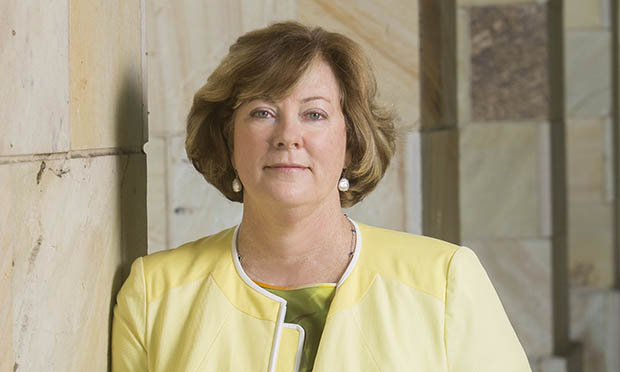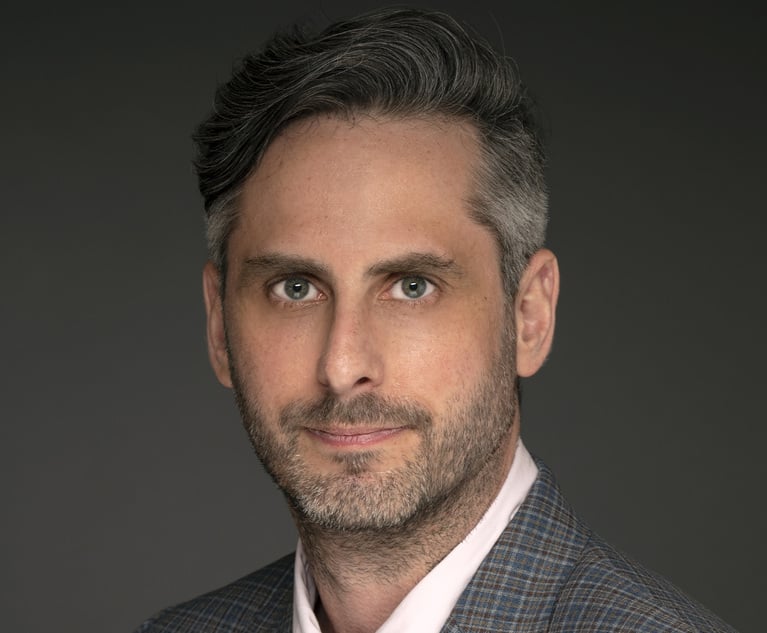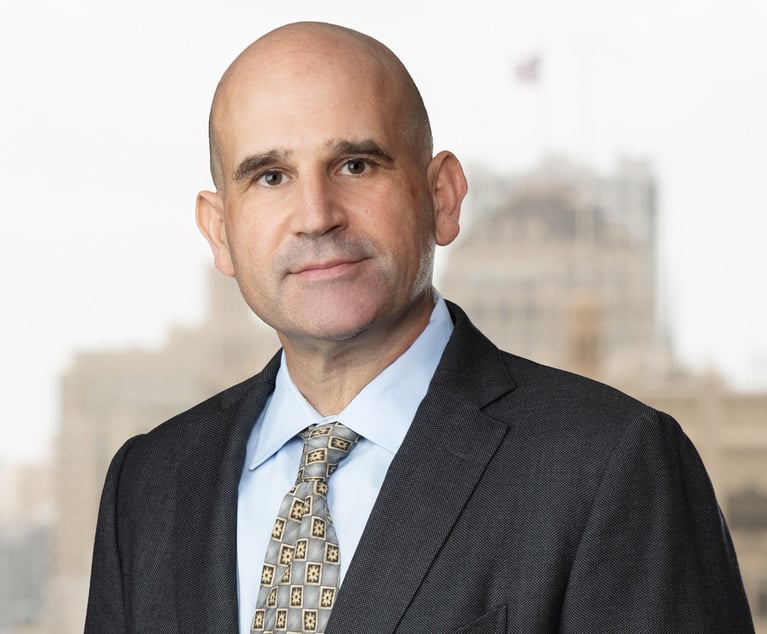Women Leaders in Tech Law 2018: Lynne Hermle, Orrick, Herrington & Sutcliffe
Hermle persuaded judges in Seattle and San Francisco to reject efforts to certify discrimination class actions against Microsoft and Twitter, respectively.
November 13, 2018 at 10:00 AM
4 minute read
 Lynne Hermle, a partner with Orrick, Herrington & Sutcliffe, (Courtesy photo)
Lynne Hermle, a partner with Orrick, Herrington & Sutcliffe, (Courtesy photo)Lynne Hermle effectively neutralized two of the most closely watched discrimination cases confronting the tech industry, persuading separate judges in Seattle and San Francisco to reject efforts to certify class actions against Microsoft and Twitter, respectively.
Name a lawyer whose work you admire and why?
Two: Cris Arguedas, one of the Bay Area's first, and best, kick-ass lead trial lawyers, and my partner Jessica Perry, who juggles an exploding high-stakes employment practice, a senior management role at Orrick (managing all litigators worldwide), an active young family, and despite the load and pressure, is a fun person to hang out with.
What's the best part about working in the tech sector?
Working with brilliant innovators, including those who are changing the world.
What's the biggest challenge?
Finding enough time to do it all well. It's like the commercial says—at the end of it all, the most truly scarce commodity is time.
What piece of advice do you give to lawyers considering a career in tech law?
If you can't think and move fast, this is not the environment for you. Skills I learned in college as a Denny's waitress—how to ensure that everyone in your section has the pancakes and coffee they want—still help me today.
What's one way technology has made your life easier?
My amazing and much-loved electric car, which for the past five years has kept me out of gas stations and into the carpool lane on 101.
One way it's made your life more difficult?
There is almost no recognition of the difference between work and time spent at the end of the day or week with family and friends. Downtime is virtually nonexistent; emails come in at all hours from countries all over the world. You have to find the time to unwind from a high-stress practice, including so that you keep a sense of humor.
Name an important opportunity you got early in your career and what you did with it?
When I came to Orrick decades ago I was lucky enough to work with a great trial lawyer and mentor, Jeff White [now a U.S. District Court judge in the Northern District of California]. He taught me how to choose trial themes, convey “fire in the belly,” which is the strong belief in your client's case, connect with a jury, and much more. Don't assume the best mentors have to look like you. If they have your personality or style, it can be a perfect match.
What's the best piece of career advice anyone ever gave you?
Don't take business disputes personally. They're not about you.
No. 1 survival tip in a work crisis:
Breathe deep, keep calm, and carry on. As Churchill said, “If you're going through hell, keep going.” It's on my wall.
In 50 words or less, how far has the tech industry gone toward tackling its gender gap since you started practicing?
Not very far, but for many of my clients, it is not for lack of trying and pushing the envelope hard.
What's one way you've had to change your thinking toward practicing law to succeed with tech industry clients?
In-house lawyers are drinking from the fire hose most days. When I showed up for my pre- Orrick in-house job I walked into an office with no furniture and a phone on the floor. The phone started ringing. I sat on the floor and helped a manager deal with two technicians who had been jailed after a fight at work. The next call came in immediately. I tried to help resolve a misguided attempt by a VP to bring a live tiger into a sales conference. It was a far cry from the complex legal analysis of EEO statistics I'd been working on in a firm the week before. Our clients often need responsive, practical solutions, not 10-page memos.
What's one area of technology that you're most excited about and why?
I love the innovative 3-D printing technology, including the machines which print replacement body parts for veterans.
This content has been archived. It is available through our partners, LexisNexis® and Bloomberg Law.
To view this content, please continue to their sites.
Not a Lexis Subscriber?
Subscribe Now
Not a Bloomberg Law Subscriber?
Subscribe Now
NOT FOR REPRINT
© 2025 ALM Global, LLC, All Rights Reserved. Request academic re-use from www.copyright.com. All other uses, submit a request to asset-and-logo-licensing@alm.com. For more information visit Asset & Logo Licensing.
You Might Like
View All
US Patent Innovators Can Look to International Trade Commission Enforcement for Protection, IP Lawyers Say

How the Deal Got Done: Sidley Austin and NWSL Angel City Football Club/Iger

How Uncertainty in College Athletics Compensation Could Drive Lawsuits in 2025

How I Made Practice Group Chair: 'Think About Why You Want the Role, Because It Is Not an Easy Job,' Says Aaron Rubin of Morrison Foerster
Trending Stories
- 1'It's Not Going to Be Pretty': PayPal, Capital One Face Novel Class Actions Over 'Poaching' Commissions Owed Influencers
- 211th Circuit Rejects Trump's Emergency Request as DOJ Prepares to Release Special Counsel's Final Report
- 3Supreme Court Takes Up Challenge to ACA Task Force
- 4'Tragedy of Unspeakable Proportions:' Could Edison, DWP, Face Lawsuits Over LA Wildfires?
- 5Meta Pulls Plug on DEI Programs
Who Got The Work
Michael G. Bongiorno, Andrew Scott Dulberg and Elizabeth E. Driscoll from Wilmer Cutler Pickering Hale and Dorr have stepped in to represent Symbotic Inc., an A.I.-enabled technology platform that focuses on increasing supply chain efficiency, and other defendants in a pending shareholder derivative lawsuit. The case, filed Oct. 2 in Massachusetts District Court by the Brown Law Firm on behalf of Stephen Austen, accuses certain officers and directors of misleading investors in regard to Symbotic's potential for margin growth by failing to disclose that the company was not equipped to timely deploy its systems or manage expenses through project delays. The case, assigned to U.S. District Judge Nathaniel M. Gorton, is 1:24-cv-12522, Austen v. Cohen et al.
Who Got The Work
Edmund Polubinski and Marie Killmond of Davis Polk & Wardwell have entered appearances for data platform software development company MongoDB and other defendants in a pending shareholder derivative lawsuit. The action, filed Oct. 7 in New York Southern District Court by the Brown Law Firm, accuses the company's directors and/or officers of falsely expressing confidence in the company’s restructuring of its sales incentive plan and downplaying the severity of decreases in its upfront commitments. The case is 1:24-cv-07594, Roy v. Ittycheria et al.
Who Got The Work
Amy O. Bruchs and Kurt F. Ellison of Michael Best & Friedrich have entered appearances for Epic Systems Corp. in a pending employment discrimination lawsuit. The suit was filed Sept. 7 in Wisconsin Western District Court by Levine Eisberner LLC and Siri & Glimstad on behalf of a project manager who claims that he was wrongfully terminated after applying for a religious exemption to the defendant's COVID-19 vaccine mandate. The case, assigned to U.S. Magistrate Judge Anita Marie Boor, is 3:24-cv-00630, Secker, Nathan v. Epic Systems Corporation.
Who Got The Work
David X. Sullivan, Thomas J. Finn and Gregory A. Hall from McCarter & English have entered appearances for Sunrun Installation Services in a pending civil rights lawsuit. The complaint was filed Sept. 4 in Connecticut District Court by attorney Robert M. Berke on behalf of former employee George Edward Steins, who was arrested and charged with employing an unregistered home improvement salesperson. The complaint alleges that had Sunrun informed the Connecticut Department of Consumer Protection that the plaintiff's employment had ended in 2017 and that he no longer held Sunrun's home improvement contractor license, he would not have been hit with charges, which were dismissed in May 2024. The case, assigned to U.S. District Judge Jeffrey A. Meyer, is 3:24-cv-01423, Steins v. Sunrun, Inc. et al.
Who Got The Work
Greenberg Traurig shareholder Joshua L. Raskin has entered an appearance for boohoo.com UK Ltd. in a pending patent infringement lawsuit. The suit, filed Sept. 3 in Texas Eastern District Court by Rozier Hardt McDonough on behalf of Alto Dynamics, asserts five patents related to an online shopping platform. The case, assigned to U.S. District Judge Rodney Gilstrap, is 2:24-cv-00719, Alto Dynamics, LLC v. boohoo.com UK Limited.
Featured Firms
Law Offices of Gary Martin Hays & Associates, P.C.
(470) 294-1674
Law Offices of Mark E. Salomone
(857) 444-6468
Smith & Hassler
(713) 739-1250






